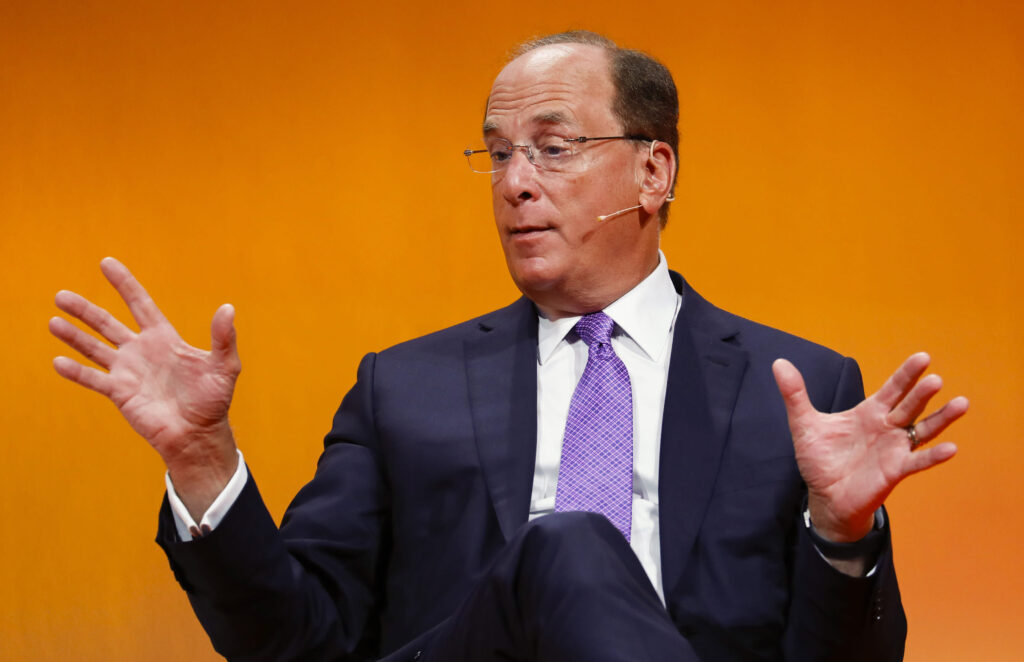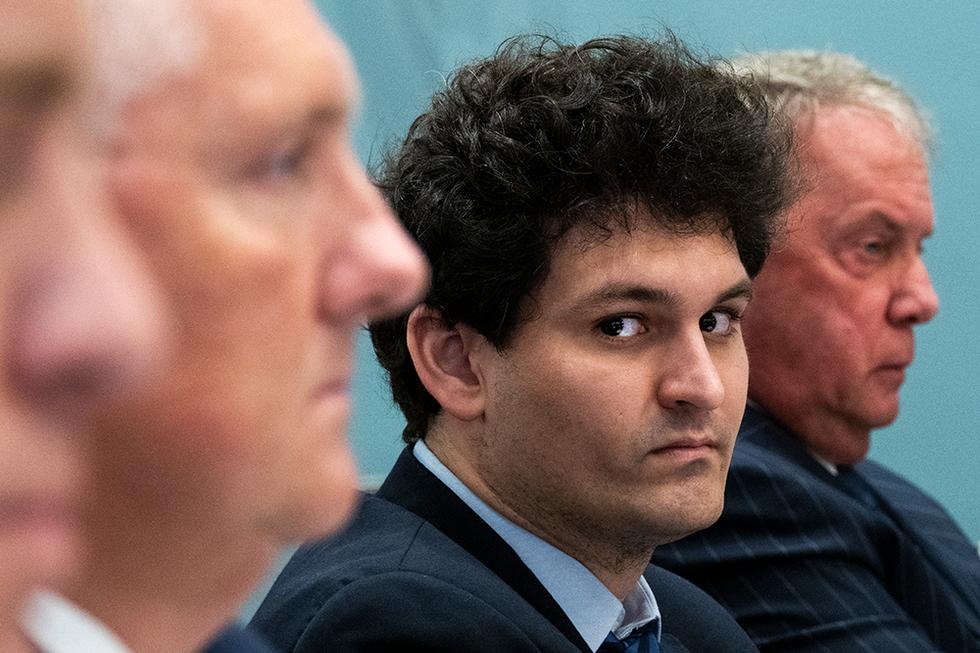BlackRock, the world’s largest asset management firm, suspects FTX’s creation of its centralised FTT native token led to the company’s collapse.
Larry Fink, BlackRock chairman and chief executive, commented at the New York Times 2022 Dealbook Summit, stating FTX’s crypto coin was at loggerheads with the “whole foundation of what crypto is.”
Despite the accusation, he added that cryptocurrencies and their underlying blockchain technologies would reshape the industry.
BlackRock Inc. CEO Larry Fink said most crypto companies will probably fold in the wake of FTX’s collapse. “I actually believe most of the companies are not going to be around,” Fink said Wednesday at the NYT Dealbook Summit.
— Gary Black (@garyblack00) November 30, 2022
What took you so long to come to that conclusion?
Fink’s criticisms of centralised crypto tokens such as BNB, FTT, XLN, and SOL continued after he said he predicted “most of these companies [controlling the tokens] are not going to be around.”
Currently, native tokens comprise roughly $57 billion out of $862 billion of the crypto market’s total market capitalisation, figures reveal.
Sorkin Speaks with Fink, SBF
Andrew Sorkin hosted the talks with Fink, with the Blackrock executive stating exchange-traded funds would contribute significantly to the development of investments and tokenisation following shortly after.
Social media has also slammed Sorkin for hosting talks with disgraced former chief executive Sam Bankman-Fried at the event. The FTX founder faces investigations from numerous intelligence agencies in the United States, the Bahamas, and others.
Coming up in a moment. The Interview. @SBF_FTX. Hit this to watch for free from anywhere. https://t.co/e8hgFoGDjs
— Andrew Ross Sorkin (@andrewrsorkin) November 30, 2022
He added: “I believe the next generation for markets, the next generation for securities, will be tokenization of securities.”
Tokenisation would benefit investments to change its industry’s ecosystem more than banks by using distributed ledgers to conduct “instantaneous settlement” complete with identifying securities data.
He added: “Think about instantaneous settlement [of] bonds and stocks, no middlemen, we’re going to bring down fees even more dramatically.”
Concluding, he explained in the interview that people could “make all the judgement calls” on FTX regarding “misbehavior of major consequence,” adding: “[If] you look at the Sequoia’s of the world they’ve had unbelievable returns over a long period of time, I am sure they did due diligence.”
FTX Disaster Continues
The news comes after many have stated Bankman-Fried misused funds via Alemeda Research, the company’s research wing, to process funds due to a lack of access to banking institutions.
The company also faced a huge bank run, triggering a liquidity crisis up to its collapse, causing millions of users to lose their entire crypto holdings.
Cryptocurrency proof of reserves has become a major focus for trading exchanges following the bankruptcy of FTX, but some have slammed the measure as “pointless,” according to a Kraken executive.
Jesse Powell, Kraken chief executive and co-founder, said in a recent Twitter post that using proof of reserves failed to disclose liabilities publicly and needed to include them to offer full transparency.
Powell has previously slammed other exchanges for failing to include crypto accounts with negative balances, adding reserves were not wallet listings but rather assets minus their liabilities.
The news comes after Binance and other exchanges published their proof of reserves amid the ongoing FTX collapse, but despite this, Powell called for greater transparency.
I’m sorry but no. This is not PoR. This is either ignorance or intentional misrepresentation.
— Jesse Powell (@jespow) November 25, 2022
The merkle tree is just hand wavey bullshit without an auditor to make sure you didn’t include accounts with negative balances. The statement of assets is pointless without liabilities. https://t.co/b5KSr2XKLB
In a Twitter thread, he called the publication “either ignorance or intentional misrepresentation.”
Powell added: “The merkle tree is just hand wavey b*llshit without an auditor to make sure you didn’t include accounts with negative balances. The statement of assets is pointless without liabilities.”
Further in the thread, he said the point of proof of reserves was to “understand whether an exchange has more crypto in its custody than it owes to clients.”
He also urged global media to avoid “overselling it and misleading consumers,” but rather learn how proof of reserve systems operate.
The news comes after multiple exchanges, including Binance, Kraken, and Coinbase have called for greater evidence to show the financial health of cryptocurrency exchanges. This comes after former FTX chief executive Sam Bankman-Fried’s mishandled crypto assets, leading to the collapse of the exchange.
Crypto owners have begun moving their assets to self-custodial wallets to avoid further issues with trading exchanges, and governments such as Singapore and Australia have begun tightening regulations for platforms operating in their respective nations.
South Korean authorities have expanded investigations to locate Terraform Labs executives after the company’s chief executive Do Kwon disappeared in hiding, reports revealed this week.
National prosecutors have issued an arrest warrant for eight of Terra’s key executives, including company co-founder Daniel Shin, investors, and engineers. The warrant accuses the group of illegally profiting from the Terra collapse in early May.
Yonhap News Agency also noted four Terraform engineers and three investors had received arrest warrants for their role in TerraUSD (UST) and LUNA. Authorities also seized over $104 million in assets from Shin after authorities suspected him of earning profits illegally.
What Are the Charges, Officers?
According to the Seoul Southern District Prosecutors Office, Shin owned Terra LUNA tokens without public investor knowledge, gaining him roughly $105 million (140 billion Korean Won) in profits.
Prosecutors explained Shin earned the pre-issued tokens amid the former bull market. He was also charged with violating the Electronic Financial Transaction Act after using customer funding and information from Chai Corp, a fintech company, to promote his cryptocurrency.
Shin’s attorney said in a public statement: “Reports that CEO Shin Hyun-seong sold LUNA at a high point and realized profits or that he made profits through other illegal methods are not true.”
Speaking against the arrest warrant, Shin pointed out: “I left (Terraform Labs) two years before the collapse of Terra and Luna, and have nothing to do with the collapse.”
The news comes after Binance chief executive Changpeng Zhao (CZ) commented that people should reduce LUNA holdings with burns and abandon those attempting to rescue the coin.
He concluded “I don’t own any LUNA or UST either. Just commenting.”
Binance, the world’s largest cryptocurrency exchange plans to rejoin the Japanese crypto market after it bought out a 100 percent share of Sakura Exchange BitCoin (SEBC), reports revealed on Wednesday.
Company chief executive Changpeng Zhao said in an announcement that his crypto platform had vowed to reenter the Japanese market and would strictly comply with regulations.
#Binance Acquires JFSA Registered Sakura Exchange BitCoin, Committed to Enter Japan Under Regulatory Compliancehttps://t.co/xfdnaY2hiO
— CZ 🔶 Binance (@cz_binance) November 30, 2022
The acquisition would signal a reentry to the world’s third-largest economy after a four-year pause.
In a statement, a Binance spokesperson told the media: “We can say that the acquisition of SEBC marks Binance’s first license in East Asia, and as Asia is a market with potential, we hope to expand in other regions.”
Rethinking Market Strategies
The news comes after the Japanese Financial Services Agency (FSA) hit the crypto trading firm with a notice for failing to obtain an operating licence. Japanese authorities issued similar warnings in 2021.
Binance has acquired similar stakes in major firms in Malaysia after it faced difficulties entering the Southeast Asian nation’s cryptocurrency markets.
It also resurfaced in Singapore after buying 18 percent of shares in a national stock exchange and regained access to the United Kingdom’s pound payment systems after teaming up with Paysafe due to blocks from regulators.
Location, Location, Regulation
According to Binance, the SEBC acquisition notes Binance’s first East Asian operating licence. It previously secured approvals to conduct business in Bahrain, Italy, France, Abu Dhabi, Spain, New Zealand, Dubai, Poland, Cyprus, Lithuania, and Kazakhstan.
Takeshi Chino, general manager of Binance Japan, said in a statement the Japanese market would “play a key role in the future of cryptocurrency adoption.
He added: “As one of the world’s leading economies with a highly-developed tech ecosystem, it’s already poised for strong blockchain uptake. We will actively work with regulators to develop our combined exchange in a compliant way for local users. We are eager to help Japan take a leading role in crypto.”
Hitomi Yamamoto, Chief Executive of SEBC, added that his company was “honored and delighted” to announce the news with Binance.
She concluded: “On top of our effort to prioritize user protection, Binance’s strong compliance system will contribute to building a more compliant atmosphere for users in Japan and help them access key crypto services needed for mass adoption in the future.”
Shira Greenberg, Israel’s chief economist for the Ministry of Finance, outlined several recommendations for regulating digital assets amid the country’s cryptocurrency adoption plans.
The 109-page report urges lawmakers to develop a more comprehensive set of regulations to control cryptocurrency trading platforms via Tel Aviv’s financial watchdogs.
She said that the country should restrict licencing requirements for trading platforms and crypto issuers along with the safe management of digital assets and subsequent funds.
Expanded Powers across Crypto Industry
Greenberg also calls for expanding powers to regulate licencing rules and build a better framework for taxing, buying, and selling cryptocurrencies. It also recommends that the government determine if it should monitor digital assets and cryptocurrency payments under Israeli law.
She also urged licencing and supervision mandates for stablecoin-issuing firms and an interministerial committee for scrutinising decentralised autonomous organisations (DAOs) using the blockchain.
Despite this, she noted technological neutrality was crucial while imposing cryptocurrency regulations.
She also cited data that Israelis only comprised 0.04 percent of total global cryptocurrency transactions, or 21 million transactions, with 2 percent owning or using crypto digital wallets.
ISA Cautions Crypto Investors
The figures come after the Israel Securities Authority (ISA) cautioned investors on cryptocurrencies in a statement, stating such investments “carry heavy risks for investors, including a tangible risk of loss of the entire investment amount.”
It added: “The ISA urges investors who are considering putting their money in this field, either directly or indirectly, to read this warning carefully before making a decision.”
Reasons behind the statement included market risks such as low liquidity and market bubbles, operational risks involving fraud or trade manipulations, cybersecurity risks due to hacking and theft of passwords, and regulatory risks leading to “significant” restrictions for companies in the sector.
Reports have revealed additional misconduct issues at FTX, with the most recent revealing dealings between it and subsidy research firm Alameda Research.
This incident comes after numerous crypto exchanges could not reach deals with banks for fiat transaction processing, with many banking institutions citing insufficient regulations on digital currencies.
FTX used Alameda Research bank accounts to avoid issues with banks and requested some customers to wire deposits to the research wing, which had ties to Silvergate Capital, reports found.
Hey guys, last night in Twitter DMs I asked Sam Bankman-Fried when Alameda first borrowed FTX customer funds, what he really thinks of the SEC, and a lot more. https://t.co/Yq8InqNPS4
— Kelsey Piper (@KelseyTuoc) November 16, 2022
The bankrupt exchange’s former chief executive, Sam Bankman-Fried, said in the Vox report it had never gambled FTX user funds, but rather loaned them to Alameda Research and assumed the latter held sufficient collateral to back the loans.
He used the company’s native FTX token, FTT, for the collateral.
FTX and Silvergate Crypto Transfers
The news comes after the company filed bankruptcy, which revealed further abuses of bank loopholes, FTX’s Alameda Research allegedly invested in a Washington state-based rural bank, which many speculate allowed Alameda to avoid applying for a bank licence.
According to a Bloomberg report, Silvergate, the financial institution implied in the misconduct, stated it did not on customer activities due to its privacy policies.
The bank provides “on-ramp” solutions for customers by transferring fiat currencies such as USD and Euros to cryptocurrency exchanges. It held $11.9 billion in cryptocurrency customer deposits, with FTX holding 10 percent of total digital assets, the bank said in a 30 September statement.
It told Bloomberg in the report it was a federally regulated, state-chartered bank “whose solutions are built on a deep-rooted commitment and proprietary approach to regulatory compliance.”
Cryptocurrency leader Bitcoin (BTC) may risk plummeting below $7,000 in a worst-case scenario, DecenTrader co-founder FilbFilb said in a recent broadcast.
Speaking on Thanksgiving day in a live stream, he warned of a sub-$7,000 trading bottom for BTC/USD.
In his talks, he said: “In my worst case scenario, I think that would be probably where we end up, like [old-school], rock-hard support.”
He referenced a bidding zone of roughly $6,500, where purchasers would likely “start refilling their bags” as the market reached bear market levels double those seen in 2018 and the onset of the coronavirus pandemic in March 2020.
Filbfilb stated the situation would “unlikely” take place but cautioned that the ongoing FTX collapse could worsen market sentiment, leading to such an incident.
He added: “Until we have further information, that seems unlikely, and as I say, I think the fact that we haven’t dumped harder than we actually really could have done is a good sign for the bulls.”
Regarding measures to take to avoid such a market bottom, crypto may have to “dodge some bullets” over the FTX crisis, he said, adding the greater market would need to keep resilient.
Historic Highs, not Market Lows?
Speaking on BTC bear market pits, Philip Swift, Decentrader’s co-founder, added Bitcoin wallets with roughly 1 BTC or more would reach one million for the first time in history due to exchange withdrawals linked to the FTX scandal.
A future Bitcoin block subsidy halving incident set to take place in 2024 may also play a key role over the next 18 months, leading to “some positive effect on price in terms of media coverage and anticipation of that next halving event,” Swift added.
Other reports from Glassnode found BTC could reach the end of its bear market cycle. Prior to the most recent developments, it speculated that the market could have reached its macro price bottom and would weather the “perfect storm” of major on-chain losses.
AAX vice president for global marketing and communications, Ben Caselin, announced his resignation from the cryptocurrency platform weeks after it had blocked withdrawals, it was confirmed in a statement.
Caselin stated in a Twitter thread that he had resigned, citing failed initiatives to fight for the crypto community. He added his position as a communications chief became “hollow” due to the failed efforts.
Dear all, it’s true I have resigned from AAX. I did fight for the community but none of the initiatives we came up with were accepted. Any role I had left for communication became hollow.
— ₿en Caselin HODL (@BenCaselin) November 28, 2022
1/4
He continued, stating: “I placed a lot of trust in this exchange as well and used it as a platform to educate. The way things are handled is without empathy and overly opaque.”
He added that many people hit by the freeze on withdrawals asked him for assistance, but he could not help them and others continued to wait for the exchange to take measures to resolve the issue.
He concluded: “During these years, AAX stood for something, but all that is now hollow. I have disabled a lot of my social media because too many people believe I can solve the issue, but I cannot. This is for the founders and board. I will continue to follow. And continue to hope.”
Another Exchange Capital Crunch?
The news comes after the cryptocurrency exchange platform announced it required additional capital due to the ongoing FTX bankruptcy, which could potentially trigger a capital crisis in the company.
The exchange stated it would have to resolve the deficit before reopening transactions.
It concluded: “In spite of the threats to our systems that we have observed from malicious actors, we are committed to starting to process withdrawals as soon as we have resolved the capital shortfall. Other issues surrounding open positions on derivatives markets, or questions around reward programs will be dealt with fairly and with reason.”
Ryan Pinder, the Bahamas’ Attorney General (AG) and Minister of Legal Affairs, confirmed in a statement on Sunday that authorities had opened an “active and ongoing” investigation of the disgraced cryptocurrency exchange FTX.
The country’s Facebook page revealed a post from the Office of the Prime Minister that noted “civil and criminal authorities” were investigating the “affairs of FTX Digital Markets.” It added that they also collaborated with “a number of specialists and experts and will continue to do so as the need arises.”
Prime Minister Pinder said in his address: “The Securities Commission, our financial intelligence unit, and the financial crimes unit of the Royal Bahamas Police Force will continue to investigate the facts and circumstances regarding FTX’s insolvency crisis and any potential violations of Bahamian law.”
Continuing, he stated that authorities would hold accountable all involved entities guilty of committing offences and would work jointly with international regulatory bodies and law enforcement agencies.
He concluded: “These events remind us of the lessons learned from securities and other financial regulation about the need for strong cross-border cooperation. The public worldwide will be best served by a strong international regulatory cooperation.”
The Bahamas Ramp Up Efforts on FTX Crisis
According to statements, the Bahamian Securities Commission terminated FTX’s business licences and ordered the firm to transfer all of its assets to a government cryptocurrency wallet for safekeeping.
The Prime Minister will also launch additional measures sanctioned by the Supreme Court in due course. He also blasted FTX Trading Limited as “extremely regrettable” after the latter accused the Government of “directing unauthorised access to the Debtors’ systems” amid its bankruptcy proceedings.
PM Pinder also encouraged continued investment in the cryptocurrency industry, stating there would be “little contagion beyond the digital asset sphere” in the Bahamas and globally.
In its statement, shortly after the crypto crisis unfolded with FTX, he said: “Based on the analysis and understanding of the FTX liquidity crisis to date, we have not identified any deficiencies in our regulatory framework that could have avoided this. In fact, it was because the Bahamas already had in place a regulatory framework for digital assets and digital asset businesses, that the regulator was able to take immediate steps in order to protect the interest of clients, creditors, and other stakeholders globally.”
Bankrupt cryptocurrency exchange FTX has triggered backlash from Singaporean lawmakers, with the nation’s prime minister and current ruling party in a difficult situation, news reports revealed on Monday.
The current leadership, Prime Minister Lee Hsien Loong and Deputy Prime Minister Lawrence Wong, are expected to receive massive scrutiny from lawmakers over allegations they failed to protect investors.
According to a report from Singapore’s Channel News Asia, parliamentarians from the Workers’ Party, the main opposition party, demanded answers from the ruling coalition regarding investment firm Temasek.
The group of members of parliament (MPs) grilled the government on its competence and oversight of the investments from Temasek and GIC, the nation’s sovereign wealth fund.
Singapore’s Workers’ Party has proposed further inquiries and discussions via a bipartisan committee tasked with interrogating Temasek on investments the company made amid the FTX crisis.
FTX Crypto Collapse Triggers Regulators
The news comes after the collapse of Sam Bankman-Fried’s FTX platform, following a massive liquidity crisis that triggered a major bank run on the platform’s native token, FTT.
According to reports, Temasek did not find any faults in FTX as it invested millions in the platform and, among 69 investors, helped raised $420 million in funds for the latter company in October last year.
Temasek invested roughly $210 million in FTX and a further $65 million in FTX.US, the exchange’s subsidy firm. Following the collapse, the Singaporean investment company wrote off $275 million in investments as a complete loss, or the entirety of its contributions to the disgraced crypto platform.
Sequoia Capital has also written off its $214 million in investments in FTX, with the cryptocurrency market remaining in turmoil and several companies facing further setbacks due to the aftermath. Governments worldwide have also demanded further regulatory oversight of the cryptocurrency market due to the FTX crash, including the Australian Treasury, Singapore’s Monetary Authority (MAS), and many others.












